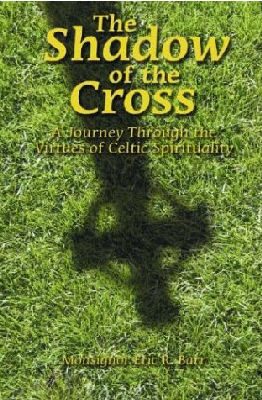
|
Posted July 25, 2006
Book: The Shadow of the Cross: A Journey Through the Virtues of Celtic Spirituality Author: Eric R. Barr ACTA Publications. Chicago, IL. 2004. Pp. 143 An Excerpt from the Jacket:
Whether discussing the place of true hospitality in the modern world or explaining the "spiritual aerobics" of asceticism, Msgr. Barr shows readers how the basic tenets of Celtic spirituality have incredible importance and meaning for today's believers. Always careful to explain the historical foundations of Celtic spirituality, he reveals the beauty and strength to be found in the shadow of the cross. Each chapter of The Shadow of the Cross ends with ideas for readers to integrate the virtues of Celtic spirituality into their everyday lives. An Excerpt from the Book: Pity is not a Christian virtue. Pity immediately lowers someone else and places us on a higher pedestal. Pity is condescending. Reaching down to assist those less fortunate may indeed help them, but it is often done out of selfish motivations, allowing us to maintain our own style of living. Hospitality immediately puts someone else in the place of Christ and makes us that person's servant. Acting hospitably comes out of wholly generous motivations. Honoring another human being made in the image of God ennobles the person practicing hospitality. Both people truly benefit. Practically speaking, how does this virtue of hospitality work in real life? Obviously, we should not be foolish. We live in a culture of suspicion precisely because there are dangers from strangers. Problems arise, however, when we become paralyzed by our fear of what might happen and do nothing, instead of practicing hospitality in our daily lives. Running down to the worst parts of a major metropolitan city to help the nameless poor is a sure way to get into trouble. We are not experienced enough to handle those situations. But in Celtic Christianity, hospitality was practiced when someone came to your door, or when you met someone on a one-to-one basis in your daily activity. These are the simple encounters where this virtue is practiced and we become adept at it. One of the great spiritual masters of the last century, Clarence Enzler, finishes his beautiful "Stations of the Cross" with Christ saying: So seek me no in far-off places. I am close at hand. Your workbench, office, kitchen. These are your altars where you offer love. And I am with you there. Hospitality is a kindly virtue, a way of welcoming Christ and others. It can be practiced by anyone, anywhere. It is a hard virtue, however, for it consists of giving of ourselves without expecting return, of honoring others as if they were Jesus himself, and especially of realizing that we are no better than the people we are called to serve. All of us belong to the human condition; all of us are in solidarity with one another. Table of Contents: Packing for the trip: the Celtic virtue of detachment The Elusive God: the Celtic virtue of awareness When Christ is the Guest: the Celtic virtue of hospitiality Christ in the ordinary: the Celtic virtue of making work holy In the Shadow of the Cross: the Celtic virtues of salvation and judgment The Cross of Christ: the Celtic virtue the Celtic virtue of repentance Spiritual Aerobics: the Celtic virtue of asceticism A Window of God: the Celtic virtue of sacrament We are not alone: the Celtic virtues of community and hope In the Presence of the Lord: the Celtic virtues of Word and Eucharist Conclusions |
|
